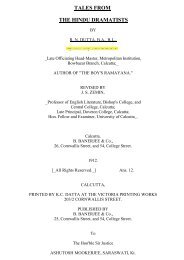TEUTONIC MAGIC - Awaken Video
TEUTONIC MAGIC - Awaken Video
TEUTONIC MAGIC - Awaken Video
You also want an ePaper? Increase the reach of your titles
YUMPU automatically turns print PDFs into web optimized ePapers that Google loves.
WUNJO<br />
Galdr-sound: wwwwwwwww (a deep buzzing w, rather like a U with lips almost closed)<br />
Letter: W, V<br />
(Joy) is had<br />
by the one who knows few troubles<br />
pain and sorrows<br />
and who to himself has<br />
blessedness and bliss<br />
and stronghold enough.<br />
— Anglo-Saxon Rune Poem<br />
The rune wunjo, “joy,” rules the virtue of cheerfulness, which is as necessary to the Teutonic hero<br />
as strength or generosity. A cheerful mind through all hardship was seen as a great part of courage, as<br />
Sigurdhr, the greatest of Teutonic heroes, tells:<br />
Ever the fearless, but the fearful never<br />
will fare well in a fight.<br />
To be glad is better than of gloomy mood<br />
whether all fall fair or foul.[1]<br />
This gladness showed forth the strength of will to endure all the sorrows and hardships of a time<br />
much more beset with bodily struggles and threats than our own. For the vitki, it is a sign of the ability to<br />
maintain her/his enthusiasm for the work in spite of all the disappointments, discouragements, and strife<br />
within that come in the process of learning magic. Wunjo is the first rune of the will itself, as well as the<br />
rune of a balanced, integrated personality. To reach the goal of wunjo, you must be able to keep your<br />
pains and sorrows from looming too large in your life, yet you must know a few troubles in order to<br />
understand how to deal with problems when they do arise.<br />
The last line of the rune poem is especially meaningful, when seen in the setting of Germanic<br />
thinking in general and Anglo-Saxon thinking in particular, in which the world-view seems to be<br />
gloomier than that of most of the Germanic peoples. The only place where you may find happiness and<br />
fellowship is the stronghold or byrg of the rune poem. An ordinary person without “stronghold enough” is<br />
doomed to sorrow, as the poem “The Wanderer” tells in such wrenching words. Life itself, even in the<br />
Christian writings of Bede, is compared to a sparrow which swoops from the dark unknown into one door<br />
of the hall, bides for a little while in the warmth and light, and flies out again into the stormy blackness.<br />
Being within the stronghold means both warding against sorrow and experiencing the joy of being with<br />
your kin and friends-the only cure for the loneliness which was such suffering for the outcast. Wunjo is<br />
the rune of fellowship and the bindings of kin, as distinct from the “social contract” of gebo.<br />
For the vitki, wunjo is the rune which melds the different sides of your own being into a whole,<br />
relieving tension and binding the sides of the self together as the kinsmen in the hall are bound. The<br />
reference to “fortress enough” hints that the vitki is never truly set apart from his/her base of power but is<br />
able to keep the unwavering brightness of outlook which is her/his strength through all trials, because<br />
there is no weak spot in him/her which would be in danger of crumbling under stress.<br />
45
















